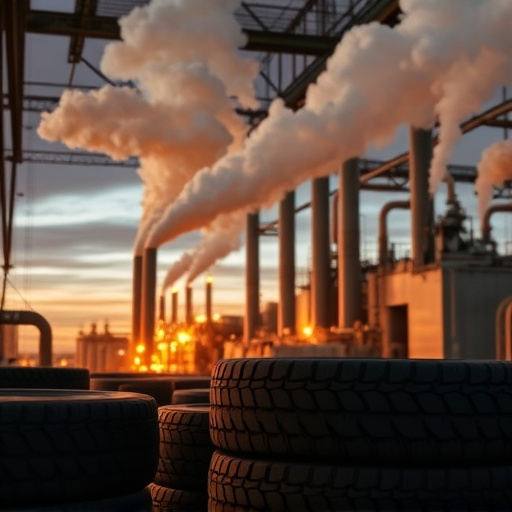
The manufacturing of tyres significantly contributes to air pollution, releasing volatile organic compounds (VOCs) and particulate matter (PM2.5 & PM10) through factory emissions. These pollutants, including benzene and toluene, pose health risks and exacerbate respiratory conditions. Traditional tyre production relies on fossil fuel combustion, leading to industrial pollution. However, a growing trend towards eco-friendly tyres, coupled with advanced emission control technologies, aims to mitigate these issues. Modern strategies involve using renewable materials and optimizing processes to reduce VOCs and PM emissions, ensuring cleaner air and minimizing health risks for nearby communities. Stricter regulations and quality standards are crucial in promoting environmentally friendly rubber production methods.
Air quality concerns have come to the forefront in the manufacturing of tyres, a process that produces significant environmental impacts. This article delves into the complex issue of tyre pollution, exploring its sources and effects on local communities. We analyze key pollutants such as Volatile Organic Compounds (VOCs) and Particulate Matter, revealing their origins and health risks. Furthermore, it discusses strategies to mitigate these issues, including eco-friendly tyre development and emission control technologies, offering a comprehensive view of the path towards cleaner manufacturing processes and improved air quality.
- The Air Quality Challenge: Tyre Manufacturing and Pollution
- – Exploring the sources of tyre pollution during production
- – Impacts on local air quality near manufacturing facilities
- Understanding Key Pollutants: VOCs, Particulate Matter, and More
The Air Quality Challenge: Tyre Manufacturing and Pollution

The manufacturing process of tyres poses significant challenges to air quality due to a range of pollutants emitted from factories. Industrial activities in rubber production contribute to both gaseous and particulate matter emissions, which have detrimental effects on local ecosystems and human health. Volatile Organic Compounds (VOCs), for instance, are released during the various stages of tyre manufacturing, including rubber compounding, mixing, and curing. These compounds are known to contain harmful substances like benzene, toluene, and formaldehyde, which can cause respiratory issues and other severe health problems.
Particulate matter, or PM, is another critical air pollutant generated from tyre factories. PM2.5 and PM10 particles, originating from the burning of fuels and abrasion of tyres, can penetrate deep into the lungs, leading to cardiovascular diseases and respiratory conditions. As global awareness of environmental issues grows, there’s an increasing push for more eco-friendly production methods and tyres that reduce these emission levels. Emission control technologies and processes focused on minimising VOCs and particulate matter are becoming integral parts of modern tyre manufacturing strategies.
– Exploring the sources of tyre pollution during production

The manufacturing process of tyres poses significant challenges to air quality due to various sources of pollution. One of the primary contributors is the release of volatile organic compounds (VOCs) from raw materials such as rubber and chemicals used in compounding. These VOCs, including benzene and toluene, are known carcinogens and contribute to ground-level ozone formation, exacerbating respiratory issues like asthma. Additionally, the combustion of fossil fuels for energy generation within factories releases particulate matter (PM), which can penetrate deep into the lungs, posing health risks ranging from acute irritation to long-term chronic conditions.
Factory emissions from tyre production also include toxic metal compounds and organic pollutants that contaminate the air and potentially affect nearby communities. The rubber industry’s reliance on energy-intensive processes further amplifies the environmental impact by increasing greenhouse gas emissions. However, there are promising developments with the advent of eco-friendly tyres, incorporating renewable materials and improved manufacturing techniques to reduce both tyre pollution and the overall air quality impact. Effective emission control strategies, including advanced filtration systems and process optimization, are crucial steps towards mitigating industrial pollution from rubber production facilities.
– Impacts on local air quality near manufacturing facilities

The manufacturing processes of tyres have been a significant contributor to local air quality issues in areas surrounding industrial facilities. During rubber production, various volatile organic compounds (VOCs) and particulate matter are released into the atmosphere as by-products. These emissions can include harmful substances like benzene, toluene, and formaldehyde, which are known carcinogens. The impact of these factory emissions is far-reaching; they not only contribute to smog and reduced air quality but also pose health risks to nearby residents and workers.
Many tyre factories have traditionally relied on inefficient combustion processes, leading to increased VOCs and particulate matter in the air. However, with growing environmental awareness, there is a shift towards eco-friendly tyres and more stringent emission control measures. Implementing modern technologies for cleaner production, such as advanced filtration systems and improved combustion techniques, can significantly reduce industrial pollution from rubber production facilities. These efforts are crucial to minimizing the negative air quality impact and ensuring a healthier environment for communities living close to these manufacturing sites.
Understanding Key Pollutants: VOCs, Particulate Matter, and More

In the tyre manufacturing process, understanding key pollutants is paramount to mitigating air quality impact and factory emissions. Volatile Organic Compounds (VOCs) are a significant concern due to their contribution to ground-level ozone formation and health risks associated with inhalation. These compounds are released during rubber production, particularly in processes involving curing and compounding. Additionally, Particulate Matter (PM), consisting of tiny particles from various sources including industrial pollution, poses severe health risks. PM2.5 and PM10, for instance, can penetrate deep into the respiratory system, leading to chronic diseases like asthma and heart conditions.
To address these issues, tyre manufacturers are increasingly focusing on eco-friendly tyres and implementing emission control measures. Advanced production techniques, such as the use of green materials and cleaner technologies, aim to reduce VOCs and PM emissions. Additionally, adopting stricter quality standards and regulatory compliance ensures that rubber production processes are more environmentally friendly, thereby minimizing the overall air quality impact.
Tyre manufacturing processes pose significant challenges to local air quality due to various pollutants like VOCs and particulate matter from factory emissions. While traditional rubber production contributes to industrial pollution with associated health risks, the industry is evolving towards eco-friendly tyres with enhanced emission control measures. By understanding and addressing these air quality impacts, manufacturers can play a crucial role in sustainable development, ensuring cleaner environments for communities near manufacturing facilities.





